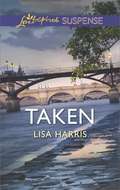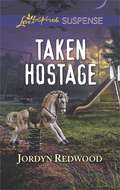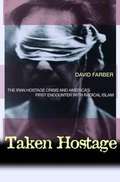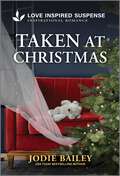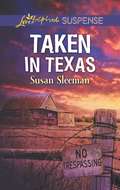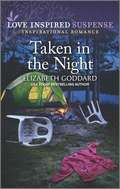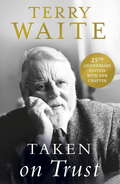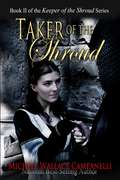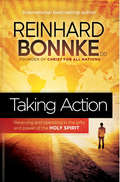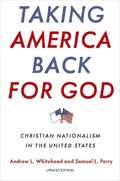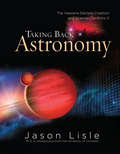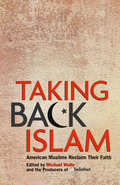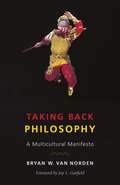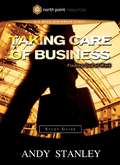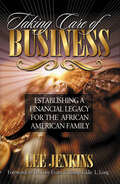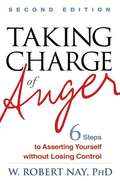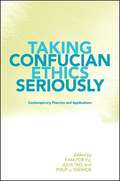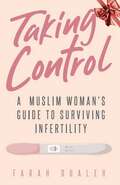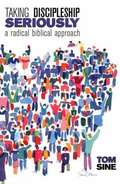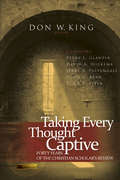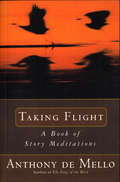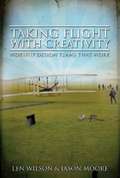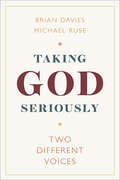- Table View
- List View
Taken
by Lisa HarrisMISSING CHILD Kate Elliot's suburban life turns upside down when her sister is shot and her niece kidnapped. Unsure of whom to trust, she turns to FBI agent Marcus O'Brian. But Kate doesn't want to leave the case to the authorities. Against the handsome agent's orders, she tracks her niece to Paris, and the City of Light quickly becomes a city of danger. Marcus can't explain why he feels such a strong connection with the headstrong woman, but soon he's taking on the role of Kate's protector. Yet when the kidnappers demand a ransom Kate can't deliver, he's not sure how much longer he can keep her alive. Now Marcus has the next twenty-four hours to save a stolen child and the woman he's grown to love.
Taken Hostage
by Jordyn RedwoodA DEADLY RANSOMWhen neurosurgeon Regan Lockhart’s daughter is kidnapped, the abductors want to make a deal for the little girl’s life. If she wishes to ever see her child again, Regan must hand over the virus she uses in a radical cancer treatment. But bounty hunter Colby Waterson can’t let her trade the cure, which is his sister’s last hope. He’s already lost a wife and baby, and he won’t lose anyone else. But when a mistake leads both him and Regan into the hands of the bad guys, the kidnappers up their demands. Now Regan must create a biological weapon or her daughter dies. For Colby, no case has ever been this personal. He’ll need every skill he’s got, because only he can save both his sister and the woman he’s growing to care for.
Taken Hostage: The Iran Hostage Crisis and America's First Encounter with Radical Islam
by David FarberOn November 4, 1979, Iranian militants stormed the United States Embassy in Tehran and took sixty-six Americans captive. Thus began the Iran Hostage Crisis, an affair that captivated the American public for 444 days and marked America's first confrontation with the forces of radical Islam. Using hundreds of recently declassified government documents, historian David Farber takes the first in-depth look at the hostage crisis, examining its lessons for America's contemporary War on Terrorism. Unlike other histories of the subject, Farber's vivid and fast-paced narrative looks beyond the day-to-day circumstances of the crisis, using the events leading up to the ordeal as a means for understanding it. The book paints a portrait of the 1970s in the United States as an era of failed expectations in a nation plagued by uncertainty and anxiety. It reveals an American government ill prepared for the fall of the Shah of Iran and unable to reckon with the Ayatollah Khomeini and his militant Islamic followers. Farber's account is filled with fresh insights regarding the central players in the crisis: Khomeini emerges as an astute strategist, singlemindedly dedicated to creating an Islamic state. The Americans' student-captors appear as less-than-organized youths, having prepared for only a symbolic sit-in with just a three-day supply of food. ABC news chief Roone Arledge, newly installed and eager for ratings, is cited as a critical catalyst in elevating the hostages to cause célèbre status. Throughout the book there emerge eerie parallels to the current terrorism crisis. Then as now, Farber demonstrates, politicians failed to grasp the depth of anger that Islamic fundamentalists harbored toward the United States, and Americans dismissed threats from terrorist groups as the crusades of ineffectual madmen. Taken Hostage is a timely and revealing history of America's first engagement with terrorism and Islamic fundamentalism, one that provides a chilling reminder that the past is only prologue.
Taken at Christmas (Trinity Investigative Team #1)
by Jodie BaileyKeeping a little girl safe means trusting no one… When ex-deputy Mia Galloway is assaulted and threatened at her town&’s Christmas parade, she&’s convinced her adopted daughter is also in danger. Mia is rescued just in time by investigator Hayden McGrath, her late husband&’s best friend, who vows to protect Mia and Ruthie. And the stakes only get higher when Ruthie&’s birth mother is found murdered. Someone desperately wants this child, and they&’ll stop at nothing to get her. With time running out, uncovering the truth is Hayden and Mia&’s only hope of saving an innocent child…From Love Inspired Suspense: Courage. Danger. Faith.Trinity Investigative Team Book 1: Taken at ChristmasBook 2: Protecting the Orphan
Taken in Texas (McKade Law #4)
by Susan SleemanA cowboy protector from her past…A McKade Law novelWorking her first case as deputy sheriff with her ex-boyfriend, Detective Cord Goodwin, Kendall McKade is determined to track the kidnappers—even if it makes her a target. Desperate to find the abducted victim, his aunt, Cord must keep Kendall safe…while also caring for his recently orphaned nephew. Teaming up threatens to rekindle Cord and Kendall’s relationship, but first they must solve a life-threatening mystery.
Taken in the Night (Mount Shasta Secrets)
by Elizabeth GoddardHer child is in danger.Protecting her is all that matters.Widow Danielle Collins runs into her ex, Reece Bradley, just in time—right after she and her daughter are abducted from their campsite. Only the former navy SEAL can save them from a mystery enemy who shot her brother. Now as they run for their lives, Danielle must figure out why they’re being hunted…and how to tell Reece the little girl he’s protecting is his daughter.From Harlequin Love Inspired Suspense: Courage. Danger. Faith.Mount Shasta Secrets
Taken on Trust
by Terry WaiteThis autobiography describes the hours before and after Terry Waite was taken hostage in January 1987 in Beirut. Waite analyzes his thoughts and feelings immediately prior to captivity - what was the nature of his role as envoy for the Archbishop of Canterbury? What was his relationship with the Americans and Colonel Oliver North? The book looks at Waite from his upbringing in Styal, Cheshire, until after his release in November 1991, when he had become one of the best-known figures of his time. It is an account of his years in solitary confinement and of the inner strengths which enabled him to survive.
Taken: To Save Her Child Taken Silent Hunter
by Lisa HarrisMISSING CHILD Kate Elliot's suburban life turns upside down when her sister is shot and her niece kidnapped. Unsure of whom to trust, she turns to FBI agent Marcus O'Brian. But Kate doesn't want to leave the case to the authorities. Against the handsome agent's orders, she tracks her niece to Paris, and the City of Light quickly becomes a city of danger. Marcus can't explain why he feels such a strong connection with the headstrong woman, but soon he's taking on the role of Kate's protector. Yet when the kidnappers demand a ransom Kate can't deliver, he's not sure how much longer he can keep her alive. Now Marcus has the next twenty-four hours to save a stolen child and the woman he's grown to love.
Taker Of The Shroud (Keeper of the Shroud #2)
by Michele Wallace CampanelliBleeding severely from battle, Prince Louis returns to Valtearea Castle to warn his kingdom that King Lightenwood's army is coming to steal the burial shroud of Jesus Christ. However, it wasn't only the blood-stained cloth that wicked King Lightenwood sought to take but also the beautiful Princess Bella. Now pitted against this brave young Prince, King Lightenwood did not expect the battle nor the intrigue from a valiant Prince willing to risk everything to rescue his wife and to become the new Keeper of the Shroud.
Taking Action: Receiving and Operating in the Gifts and Power of the Holy Spirit
by Reinhard BonnkeGod uses manpower. We need God&’s power. God works when we work.Millions of people all over the world have been introduced to Jesus through the ministry of Reinhard Bonnke. In Taking Action he describes how we too can be an extension of God&’s love to the world by partnering with the Holy Spirit.With a firsthand account of the mighty manifestations of God at work today, Bonnke takes a careful look at what Scripture teaches about the anointing and gifts of the Holy Spirit in general and then explains each of the specific gifts listed by the apostle Paul. Jesus lived, worked, and prayed in the power of the Holy Spirit. In the Gospel of John He says, &“He who believes in Me, the works that I do he will do also.&” With this same anointing, we can live this way as well.
Taking America Back For God: Christian Nationalism In The United States
by Samuel L. Perry Andrew L. WhiteheadHow did so many white, conservative Christians come to embrace Donald Trump? Why do many argue so vigorously for preserving Confederate monuments and against the teaching of "Critical Race Theory"? Why do many Americans seem so unwilling to acknowledge the injustices that ethnic and racial minorities experience in the United States? Why do a sizeable proportion of Americans continue to oppose women's equality in the workplace and in the home? To answer these questions, Taking America Back for God points to the phenomenon of "Christian nationalism," the belief that the United States is-and should be-a Christian nation. Christian ideals and symbols have long played an important role in American public life, but Christian nationalism is about far more than whether the phrase "under God" belongs in the pledge of allegiance. At its heart, Christian nationalism demands that we must preserve a particular kind of social order, an order in which everyone--Christians and non-Christians, natural-born and immigrants, whites and minorities, men and women recognizes their "proper" place in society. In this award-winning book, the first comprehensive empirical analysis of Christian nationalism in the United States, Taking America Back for God illustrates the influence of Christian nationalism on today's most contentious social and political issues. Drawing on multiple sources of national survey data as well as in-depth interviews, Andrew Whitehead and Samuel Perry document how Christian nationalism shapes what Americans think about who they are as a people, what their future should look like, and how they should get there. Americans' stance toward Christian nationalism provides powerful insight into what they think about immigration, Islam, gun control, police shootings, atheists, gender roles, and many other political issues-very much including who they want in the White House. Taking America Back for God is a guide to one of the most important-and least understood-forces shaping American politics.
Taking Back Astronomy
by Dr Jason Lisle"This book is meant to be an introduction only - a starting point to a biblical view of the universe. . . . Who knows what amazing truths are waiting to be discovered if only the shackles of secular thinking are removed. Now is the time of discovery..." Take a breathtaking look at the universe that is comprehensive guide to the heavens! Sit back and explore the world at your fingertips in this book which: Explains the scale and size of the universe that is hard for our minds to imagine - yet can only indicate the Master's hand at work. Over 50 full-color, rarely seen photos of stars, nebulas, and galaxies. Filled with facts that challenge secular theories and models of the universe - how it began and how it continues to amaze the scientific community. Explores numerous evidences that point to a young universe: magnetic poles of planets, the spiral shape of galaxies, comets and how long scientists think they can last, and much more. With a doctorate in astrophysics from the University of Colorado, Dr. Jason Lisle is your guide to the universe beyond our world in this remarkable book. Step out among the stars and experience the truly awesome power of God through this glimpse of His vast creation.
Taking Back Islam: American Muslims Reclaim Their Faith
by Michael Wolfe Editors of Beliefnet“The thinking person's guide to Islam in a post-9/11 America” —Publisher’s WeeklyIslam, the least understood of the world's great religions, is balanced on a precipice between the past and the future, between fanatical fundamentalists and progressives advocating peace. Noted Islamic authority Michael Wolfe moderates 35 expert speakers, writers, and leaders, including Yusuf Islam (Cat Stevens) and Karen Armstrong, the bestselling author of A History of God and Islam. Leading authorities discuss the future of Islam, tear down false stereotypes, review the historical realities that have shaped the religion, and examine paradoxes and schisms within the faith. At a time when every Muslim is forced to defend his faith and Americans are curious about Islam's basic tenets, this book answers many questions at the same time that it ponders both the danger and promise of the future.
Taking Back Philosophy: A Multicultural Manifesto
by Bryan W. Van NordenAre American colleges and universities failing their students by refusing to teach the philosophical traditions of China, India, Africa, and other non-Western cultures? This biting and provocative critique of American higher education says yes. Even though we live in an increasingly multicultural world, most philosophy departments stubbornly insist that only Western philosophy is real philosophy and denigrate everything outside the European canon. In Taking Back Philosophy, Bryan W. Van Norden lambastes academic philosophy for its Eurocentrism, insularity, and complicity with nationalism and issues a ringing call to make our educational institutions live up to their cosmopolitan ideals. In a cheeky, agenda-setting, and controversial style, Van Norden, an expert in Chinese philosophy, proposes an inclusive, multicultural approach to philosophical inquiry. He showcases several accessible examples of how Western and Asian thinkers can be brought into productive dialogue, demonstrating that philosophy only becomes deeper as it becomes increasingly diverse and pluralistic. Taking Back Philosophy is at once a manifesto for multicultural education, an accessible introduction to Confucian and Buddhist philosophy, a critique of the ethnocentrism and anti-intellectualism characteristic of much contemporary American politics, a defense of the value of philosophy and a liberal arts education, and a call to return to the search for the good life that defined philosophy for Confucius, Socrates, and the Buddha. Building on a popular New York Times opinion piece that suggested any philosophy department that fails to teach non-Western philosophy should be renamed a “Department of European and American Philosophy,” this book will challenge any student or scholar of philosophy to reconsider what constitutes the love of wisdom.
Taking Care of Business Study Guide: Finding God at Work
by Andy StanleyWhat Does the Boss Have to Say? Work. For most people, it's a necessity. For some, it's a passion. And for others, it's a four-letter word to be avoided as much as possible. In this DVD and accompanying study guide from North Point Resources, readers will come to grasp the one perspective on work that really matters:God's. He ordained it and He laid out specific guidelines enabling workers to achieve maximum success and fulfillment. In each session, Andy Stanley offers insights on common, specific problem areas people have, from dealing with coworkers and superiors, to boldly living the Christian faith, to balancing work and family. Your Guide from 9:00 to 5:00 Work. For most people, it's a necessity. For some, it's a passion. And for others, it's a four-letter word to be avoided when possible. But for all of us, only one perspective on work really matters: God's. He ordained it and He laid out specific guidelines for us to achieve maximum success and fulfillment while on the job. Designed for small group or personal use, this companion study guide to theTaking Care of BusinessDVD addresses specific problem areas we're all familiar with-from dealing with coworkers and superiors while exemplifying Christ, to balancing our work and home life. This study guide is complete with a leader's guide and six lessons, including easy-to-do exercises and discussion questions. Story Behind the Book A new addition to the North Point Resources brand group from a series taught by Andy Stanley at North Point Community Church .
Taking Care of Business: Establishing a Financial Legacy for Your Family
by Lee JenkinsDespite trillions of dollars spent and the development of welfare programs, poverty has actually gotten much worse. Nationally, 30% of black families live below the poverty line, an increase of 20% since 1969. Lee Jenkins knows that poverty is not corrected by a redistribution of wealth, but by the transformation of people. In his new book, he offers readers comprehensive strategies for setting goals in the areas of family, faith, friends, finances, and fitness.
Taking Care of Business: Establishing a Financial Legacy for Your Family
by Lee JenkinsDespite trillions of dollars spent and the development of welfare programs, poverty has actually gotten much worse. Nationally, 30% of black families live below the poverty line, an increase of 20% since 1969. Lee Jenkins knows that poverty is not corrected by a redistribution of wealth, but by the transformation of people. In his new book, he offers readers comprehensive strategies for setting goals in the areas of family, faith, friends, finances, and fitness.
Taking Charge of Anger, Second Edition
by W. Robert NayThis straight-talking book-grounded in over 25 years of experience-has already helped many tens of thousands of readers understand and manage destructive anger in all its forms. Anger expert Dr. Robert Nay guides you to Figure out which of the five "faces of anger" are a problem for you, from passive-aggression to all-out rage. Recognize the early warning signs of anger in your physical sensations and thoughts. Master cooling-off strategies that work in the heat of the moment. Identify and change unrealistic expectations you have for yourself and other people. Communicate effectively when differences arise. Practice your new skills in everyday life-until they become second nature. The second edition includes a new chapter on forgiveness, plus updated examples and resources. If anger is getting in the way of your goals-or disrupting the relationships most precious to you-the time to make changes is now.
Taking Confucian Ethics Seriously: Contemporary Theories and Applications (Suny Series in Chinese Philosophy and Culture)
by Philip J. Ivanhoe Julia Tao Kam-Por YuMany—though surely not all—people who have lived in Confucian societies have taken Confucian ethics seriously for hundreds of generations, but why should one study Confucian ethics today?
Taking Control: A Muslim Woman's Guide to Surviving Infertility
by Farah Dualeh&“Taking Control&” aims to provide a guidance for Muslim women who are trying to conceive. Author Farah Dualeh, who herself has tried to conceive for many years, shares her personal experience along with psychological tools to cope with this traumatic ordeal for women who struggle to become mothers. Dualeh also gives extensive content from Islamic perspective, including rulings on certain issues, as well as prayers.In this book, women who are trying to conceive will be encouraged to take control of their infertility experience at different levels:* within themselves * within their marriage * in relation to social pressures * on treatment options * and on what their family can look like (even when different from the 'norm')
Taking Discipleship Seriously: A Radical Biblical Approach
by Tom Sine"When Jesus calls us to follow him, he is not looking for occasional use of our gifts ... he wants our lives." With this bold challenge, Tom Sine calls on today's Christians to recapture the total commitment of first-century disciples who truly lived out their faith in answer to Christ's call. Such a radical biblical view of God's kingdom has implications touching every area of a Christian's life as well as a far-reaching effect on the larger mission of the church. Sine urges churches to set aside self-involved agendas to seek God's will in a world of exploding needs. They are encouraged to become agents of change in their communities, to improve the plight of needy persons with a "hand-up" rather than a handout. As individuals and study groups read how Christians have placed concern for God's kingdom above personal desires, they will be stimulated to think deeply about their responses to Christ's invitation "Follow me."
Taking Every Thought Captive: Forty Years of the Christian Scholar's Review
by Don W. KingTaking Every Thought Captive celebrates forty years of the Christian Scholar's Review by collecting a representation of the best scholarship to appear in its pages from inception in 1970 through 2010.Over its forty years of publication, CSR has had two main objectives: "the integration of Christian faith and learning on both the intra- and inter-disciplinary levels" and "to provide a forum for the discussion of the theoretical issues of Christian higher education."The twenty-four articles gathered in this anniversary collection reflect both of these objectives. As a whole, this collection witnesses to the rigors of the intellectual enterprise found within the pages of CSR and affirms an ongoing commitment to support, enhance, and promote Christian scholarship.Contributors include: Carl F. H. Henry, Arthur F. Holmes, George Marsden, Mary Stewart Van Leeuwen, Stanley Hauerwas, Richard J. Mouw, Mark A. Noll, Dallas Willard, Elizabeth Newman, Roger Lundin, Nancy Ammerman, Nicholas Wolterstorff, and fifteen others.
Taking Flight
by Anthony De Mello"Both what you run from -- and what you yearn for -- are within you." --Anthony de Mello, S.J.In the tradition of his bestselling Song of the Bird, de Mello has written these story meditations as stepping stones toward a spiritual life based on self-knowledge and understanding.This book contains over 250 stories, grouped under the themes of Prayer, Awareness, Religion, Grace, "Saints," Self, Love, and Truth. Although derived from a variety of countries and cultures, these tales share the spiritual heritage and popular humor of the entire human race. As he does so skillfully in his other books, de Mello uses the medium of the story to enable his readers to work through their problems and arrive at essential Truth. With each seemingly simple anecdote comes a lesson powerful enough to break down barriers that limit self-understanding -- which in turn fosters a better understanding of others, in all situations in life. "Even if you read the stories in this book only for the entertainment," he warns, "there is no guarantee that an occasional story will not slip through your defenses and explode when you least expect it to."Taking Flight offers a joyful, transcendental experience. De Mello pilots a spiritual journey with the skill of a true master.
Taking Flight With Creativity: Worship Design Teams That Work
by Len Wilson Jason MoorePastors and church leaders in many congregations have attempted to form teams for the purpose of planning, or designing, worship. Getting a group of people together in one room is fairly easy. But whether large or small church, staff or volunteer, most discover that it is difficult to form a team that actually works. Using the metaphor of early flight, this resource analyzes how to be a part of a worship design team that works. Major sections include discovering a strategic approach to worship, tips for team composition, a look at how to overcome a series of obstacles that frequently keep teams from finding success together, and some of the usual “mechanical difficulties” that keep teams grounded.
Taking God Seriously: Two Different Voices
by Michael Ruse Brian DaviesIs debate on issues related to faith and reason still possible when dialogue between believers and non-believers has collapsed? Taking God Seriously not only proves that it is possible, but also demonstrates that such dialogue produces fruitful results. Here, Brian Davies, a Dominican priest and leading scholar of Thomas Aquinas, and Michael Ruse, a philosopher of science and well-known non-believer, offer an extended discussion on the nature and plausibility of belief in God and Christianity. They explore key topics in the study of religion, notably the nature of faith, the place of reason in discussions about religion, proofs for the existence of God, the problem of evil, and the problem of multiple competing religious systems, as well as the core concepts of Christian belief including the Trinity and the justification of morality. Written in a jargon-free manner, avoiding the extremes of evangelical literalism and New Atheism prejudice, Taking God Seriously does not compromise integrity or shy from discussing important or difficult issues.
